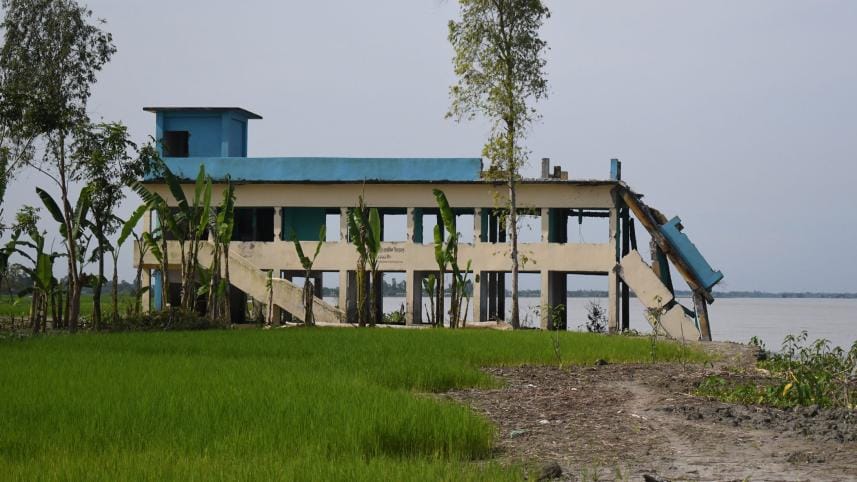42% of disaster-hit households forced to use up savings: study

Nearly 42 percent of households affected by disasters across several districts in Bangladesh were compelled to use up their personal savings to cope with the impact of floods, cyclones, drought, and river erosion, according to a new study.
The findings were revealed yesterday in Dhaka at the launch of the "Bangladesh Poverty Watch Report 2024", prepared jointly by the Institute for Inclusive Finance and Development (InM) and the Centre for Inclusive Development Dialogue (CIDD).
The report reviews how climate change on a global scale is affecting Bangladesh, highlighting variations in climate vulnerability across the country. It focuses in particular on the link between poverty and climate change in regions most at risk.
Researchers studied seven vulnerable districts — Chuadanga, Naogaon, Bhola, Sunamganj, Kurigram, Satkhira, and Bagerhat.
In each district, 40 households were picked for the study, covering a range of geographical and socio-economic contexts.
The study also found that only 7.9 percent of households received help from relatives, while fewer than 1 percent secured support from government or private institutions.
Many families turned to informal loans and microfinance, especially in Satkhira and Bhola, where microfinance organisations are more active.
Chuadanga reported the highest reliance on savings, with 57.5 percent of households dipping into their funds. This was followed by Naogaon, Satkhira, and Kurigram.
In contrast, only 27.5 percent of households in Bagerhat could afford to depend on savings, pointing to greater vulnerability in coastal areas that frequently suffer climate shocks.
The study also examined household income trends before, during, and after disasters.
It found that incomes fell sharply during the month a disaster struck, regardless of the type of event.
Cyclones caused the most severe immediate impact, slashing household income by nearly 35 percent — from an average of Tk 16,971 to Tk 10,945.
Yet recovery was swift, with income rising to Tk 18,293 after the disaster, almost returning to pre-cyclone levels.
While presenting the findings, Farhana Nargis, research fellow at InM, said tackling poverty and climate change could not be done separately.
"The two can much more easily be achieved if they are addressed together in Bangladesh," she said.
Bangladesh, she added, has a real chance to cut climate-driven poverty through inclusive, climate-smart development.
She called for urgent investment in areas such as urban transport, energy, and forest protection to avoid long-term carbon lock-in.
Among others who spoke at the event were Qazi Kholiquzzaman Ahmad, chairman of InM; Mustafa K Mujeri, executive director of InM; and A K Enamul Haque, director general of the Bangladesh Institute of Development Studies.



 For all latest news, follow The Daily Star's Google News channel.
For all latest news, follow The Daily Star's Google News channel.
Comments